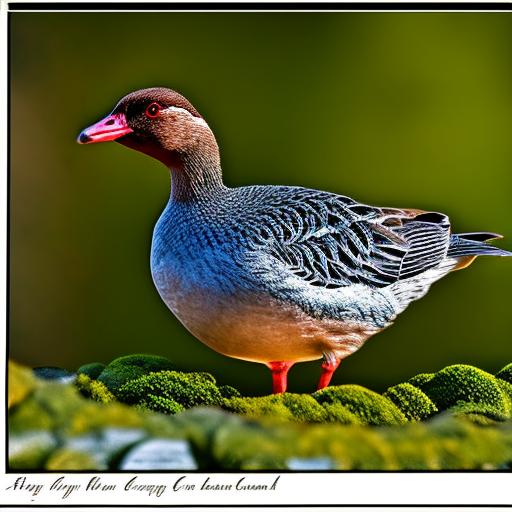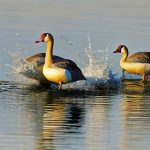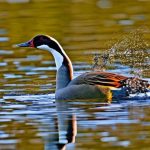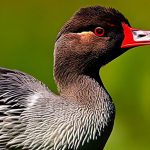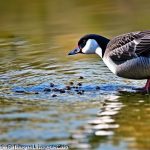Geese are beautiful and majestic creatures that are often found near bodies of water, such as ponds, lakes, and rivers. While they are a sight to behold in the wild, they can become a nuisance when they invade gardens and other landscaped areas. Geese are known for their voracious appetites and can quickly decimate a garden by eating plants, trampling delicate flowers, and leaving behind droppings that can create unsightly and unsanitary conditions. Their presence can also deter other wildlife and even humans from enjoying the garden space. As such, finding effective and humane ways to deter geese from gardens is a common concern for many gardeners and property owners.
Key Takeaways
- Geese can cause damage to gardens and landscapes through their feeding and nesting habits.
- Using plants to deter geese can provide a natural and environmentally friendly solution to the problem.
- Plants such as tall grasses, shrubs, and flowers with strong scents can effectively repel geese from gardens.
- Incorporating goose-repellent plants in your garden can be done through strategic placement and maintenance.
- Regular pruning, watering, and fertilizing can help maintain the effectiveness of goose-repellent plants in your garden.
Understanding the Benefits of Using Plants to Deter Geese
Using plants to deter geese from gardens can be an effective and environmentally friendly solution to the problem. Unlike harsh chemicals or physical barriers, goose-repellent plants offer a natural and aesthetically pleasing way to discourage geese from entering and damaging garden spaces. Additionally, these plants can provide other benefits such as adding beauty, attracting beneficial wildlife, and even serving as edible or medicinal resources. By incorporating goose-repellent plants into the garden, it is possible to create a harmonious and sustainable environment that is less attractive to geese while enhancing the overall appeal and functionality of the space.
Types of Plants That Repel Geese
There are several types of plants that are known to repel geese due to their scent, taste, or texture. One popular option is the use of strong-smelling herbs such as lavender, mint, and rosemary. These plants emit fragrances that are unpleasant to geese and can help deter them from entering the garden. Another effective category of goose-repellent plants is those with prickly or spiky foliage, such as holly bushes, barberry shrubs, and spiky grasses. These plants create a physical barrier that can make it uncomfortable for geese to walk through or feed on, thus encouraging them to seek out more hospitable environments. Additionally, tall grasses and reeds can be used to create visual barriers that obscure the view of the garden from geese, making it less appealing for them to land and explore.
How to Incorporate Goose-Repellent Plants in Your Garden
Incorporating goose-repellent plants into your garden can be done in a variety of ways, depending on the specific needs and layout of the space. One approach is to create a perimeter of goose-repellent plants around the outer edges of the garden to act as a natural barrier. This can be achieved by planting a mix of tall grasses, spiky shrubs, and strong-smelling herbs along the borders of the garden to discourage geese from entering. Another method is to intersperse goose-repellent plants throughout the garden beds and borders to create a more integrated and visually appealing deterrent. This approach can help protect vulnerable plants and create a cohesive design that blends both aesthetic and practical considerations. Additionally, incorporating goose-repellent plants in containers or raised beds can offer flexibility in placement and make it easier to move or rearrange the plants as needed.
Maintaining and Caring for Goose-Repellent Plants
Once goose-repellent plants have been incorporated into the garden, it is important to provide proper maintenance and care to ensure their effectiveness in deterring geese. Regular watering, pruning, and fertilizing can help keep the plants healthy and vigorous, which in turn can enhance their ability to repel geese. It is also important to monitor the condition of the plants and address any issues such as pest infestations or disease promptly to prevent them from becoming weak or unattractive to geese. Additionally, periodically refreshing or replanting goose-repellent plants can help maintain their potency and prevent geese from becoming accustomed to their presence. By staying proactive in caring for these plants, it is possible to create a sustainable and long-term solution for deterring geese from the garden.
Additional Strategies for Keeping Geese Away from Your Garden
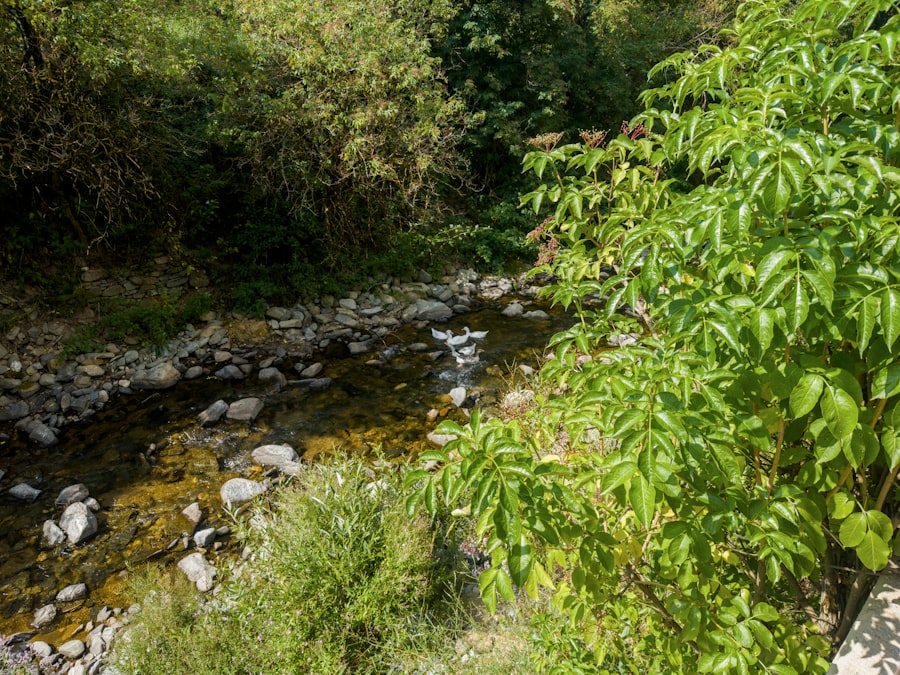
In addition to using goose-repellent plants, there are several other strategies that can be employed to keep geese away from the garden. One approach is to use visual deterrents such as scarecrows, reflective objects, or predator decoys to create an environment that is less inviting to geese. These visual cues can disrupt the sense of safety and security that geese seek out, encouraging them to find alternative locations for feeding and resting. Another option is to use sound deterrents such as wind chimes, bells, or motion-activated devices that emit noises that are unpleasant or startling to geese. By combining these visual and auditory deterrents with goose-repellent plants, it is possible to create a multi-faceted approach that can effectively discourage geese from invading the garden.
Conclusion and Final Tips for Using Plants to Deter Geese
In conclusion, using plants to deter geese from gardens offers a natural, sustainable, and aesthetically pleasing solution to a common problem faced by many gardeners and property owners. By understanding the benefits of using goose-repellent plants, learning about the types of plants that repel geese, incorporating these plants into the garden, maintaining and caring for them, and employing additional strategies for keeping geese away, it is possible to create an environment that is less attractive to geese while enhancing the overall appeal and functionality of the garden space. In addition to these strategies, it is important to stay informed about local regulations and best practices for managing geese in your area, as well as being mindful of ethical considerations when deterring wildlife from garden spaces. With careful planning and thoughtful implementation, using plants to deter geese can be an effective and harmonious way to protect gardens while respecting the natural world around us.
Looking for natural ways to keep geese away from your property? Check out this informative article on PoultryWizard that discusses how certain plants can act as a deterrent for geese. By incorporating these plants into your landscaping, you can create a barrier that discourages geese from entering your property. It’s a sustainable and eco-friendly solution that can help protect your outdoor spaces from unwanted bird activity.
FAQs
What are some plants that can keep geese away?
Some plants that are known to repel geese include tall grasses, shrubs, and flowers such as switchgrass, fountain grass, and yarrow.
How do these plants help keep geese away?
These plants create an environment that is less attractive to geese by providing less open space for them to graze and reducing their visibility of potential predators.
Are there any other methods to keep geese away from an area?
Yes, other methods to keep geese away include using visual deterrents such as scarecrows or reflective tape, installing physical barriers like fences or netting, and using sound deterrents such as noise-making devices.
Are these plants safe for the environment and other wildlife?
Yes, the plants mentioned are generally safe for the environment and other wildlife. However, it’s important to research and choose plants that are native to the area and won’t negatively impact the local ecosystem.
Meet Walter, the feathered-friend fanatic of Florida! Nestled in the sunshine state, Walter struts through life with his feathered companions, clucking his way to happiness. With a coop that’s fancier than a five-star hotel, he’s the Don Juan of the chicken world. When he’s not teaching his hens to do the cha-cha, you’ll find him in a heated debate with his prized rooster, Sir Clucks-a-Lot. Walter’s poultry passion is no yolk; he’s the sunny-side-up guy you never knew you needed in your flock of friends!

